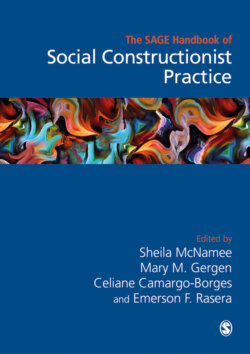Читать книгу The Sage Handbook of Social Constructionist Practice - Группа авторов - Страница 38
На сайте Литреса книга снята с продажи.
To Know and Not to Know: Dialogic Social Inquiry
ОглавлениеThis chapter is the result of the collaboration of authors Rocio Chaveste and M. L. Papusa Molina with former students, Christian Lizama, Cynthia Sosa, and Carolina Torres. Its structure is developed around the act of writing a thesis from a Dialogic Social Inquiry approach, developed at the Kanankil Institute in Merida, Mexico. It is a very helpful description of how research is actually done, as an ongoing activity among a group of students. The students enact ‘Design research,’ based on four principles: (1) research as relational and collaborative; (2) research as useful and generative; (3) research as organic and dynamic; and (4) research as engaged in complexity and multiplicity (as defined in Chapter 3).
The approach involves constructing the research question(s); inviting co-researchers; focusing on ethical issues, including maintaining respect and curiosity for the diverse and complex moral orders practices by those with whom one works; enacting forms of inquiry that depend upon dialogue with other people; and, engaging together with the researcher on a particular topic. The manner in which the research takes place is decided through an emerging process, involving ongoing, reiterative processes with others who are not primarily responsible for the project.
